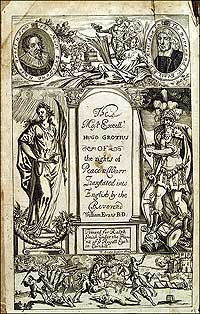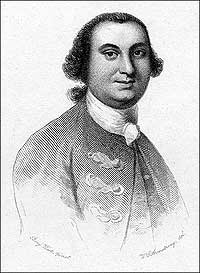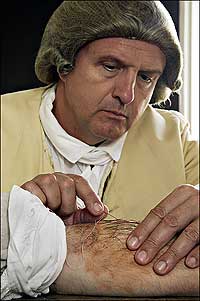Page content
Colonial Germ Warfare
by Harold B. Gill Jr.
The humanizing of War! You might as well talk of the humanizing of Hell...As if war could be civilized! If I'm in command when war breaks out I shall issue my order—"The essence of war is violence. Moderation in war is imbecility. Hit first, hit hard, and hit everywhere!"
—Sir Reginald Bacon, The Life of Lord Fisher
of Kilverstone, Admiral of the Fleet
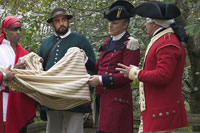
British Captain Simeon Ecuyer, portrayed by Ken Treese, second from right, offered blankets infected with smallpox to the Indians besieging Fort Pitt. From left, interpreters Christopher Jones, Ted Boscana, Treese, and Patrick Andrews.
During Pontiac's uprising in 1763, the Indians besieged Fort Pitt. They burned nearby houses, forcing the inhabitants to take refuge in the well-protected fort. The British officer in charge, Captain Simeon Ecuyer, reported to Colonel Henry Bouquet in Philadelphia that he feared the crowded conditions would result in disease. Smallpox had already broken out. On June 24, 1763, William Trent, a local trader, recorded in his journal that two Indian chiefs had visited the fort, urging the British to abandon the fight, but the British refused. Instead, when the Indians were ready to leave, Trent wrote: "Out of our regard for them, we gave them two Blankets and an Handkerchief out of the Small Pox Hospital. I hope it will have the desired effect."
It is not known who conceived the plan, but there's no doubt it met with the approval of the British military in America and may have been common practice. Sir Jeffery Amherst, commander of British forces in North America, wrote July 7, 1763, probably unaware of the events at Fort Pitt: "Could it not be contrived to Send the Small Pox among those Disaffected Tribes of Indians? We must, on this occasion, Use Every Stratagem in our power to Reduce them." He ordered the extirpation of the Indians and said no prisoners should be taken. About a week later, he wrote to Bouquet: "You will Do well to try to Innoculate the Indians by means of Blanketts as well as to try Every other method that can serve to Extirpate this Execrable Race."
Though a connection cannot be proven, a smallpox epidemic erupted in the Ohio Valley that may have been the result of the distribution of the infected articles at Fort Pitt. Whatever its origins, the outbreak devastated the Indians. Such tactics appear atrocious and barbaric to modern readers, but at the time anything was alright to use against "savages." Nor was all-out war foreign to the Indians. During Pontiac's Rebellion the Indian warriors killed about 2,000 civilian settlers and about 400 soldiers. They, too, tried to "extirpate" the enemy.
The Fort Pitt incident is the best documented case of deliberately spreading smallpox among unsuspecting populations, but it likely was not the first time such a stratagem was employed by military forces. It appears that Ecuyer and Amherst proposed the same idea independently at about the same time, suggesting that the practice was not unusual.
Attempts to spread sickness and disease among enemy forces has a long history. The ancient Assyrians poisoned their enemy's water supply, and ancient Greeks poisoned the water supply of their enemy with the herb hellebore, which caused violent diarrhea. In 1340 attackers used a catapult to throw dead animals over the walls of the castle of Thun L'Evêque, causing such a stink that the air was so unendurable the defenders negotiated a truce.
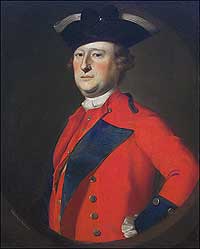
Sir Jeffrey Amherst, shown here in Joseph Blackburn's 1758 painting, suggested Bouquet infect the Indians with smallpox. -Mead Gallery, Amherst
In Virginia Dr. John Pott, the physician at Jamestown, was said to have poisoned Indians in 1623, during a round of retaliation for a Powhatan uprising in which 350 English died. On May 22, Captain William Tucker with twelve men went to the Potomac River to secure the release of English prisoners held by Indians. When the party arrived, it invited the Indians' leader and his men to conclude a treaty of peace with a drink or two of sack that Pott had prepared for the occasion. The Indians demanded that the English interpreter take the first drink, which he did, but out of a different container. Afterward a group of Indians, including two chiefs, were walking with an English interpreter. At a given signal the interpreter dropped to the ground and the English discharged a volley of shot into his Indian companions. The English said that about 200 savages died of poison and fifty from wounds. The colonists had invited the Indian leader Opechancanough, the mastermind of the uprising, to attend the party and were disappointed by not finding him among the dead.
Some people had reservations about using such tactics, even against savages. It was reported that Pott was "very much blamed" for his actions.
By the seventeenth century European military leaders were becoming conscious of ethics in warfare, and rules to follow in "civilized war" were slowly being developed. Hugo Grotius published his codification of accepted rules of war in 1625. Grotius departed from the classical view, and did not regard the entire population of the antagonist state as the enemy and subject to enslavement or extermination. Other writers were making attempts to better define "enemy." Some thought distinction should be made between those who were part of the military force and those who were not.
The next significant work on the rules of war was Emmerich de Vattel's Law of Nations, published in 1758. De Vattel thought "the enemy may be deprived of his property and of whatever may add to his strength and put him in a position to make war," and further, "a belligerent lays waste to a country and destroys food and provender in order that the enemy may not be able to subsist there...Such measures are taken in order to attain the object of the war, but they should be used with moderation and only when necessary."
Grotius and de Vattel thought women and children, as well as the elderly and infirm, should not be considered the "enemy." They thought it was an improper practice to use poison weapons and to contaminate drinking water. Neither specifically condemned the intentional spread of disease among the enemy, most likely because, with the exception of smallpox and syphilis, it was not known how diseases spread. What impact these writers and other philosophers made on the military leaders is not known, but it appears that they were aware public opinion regarded it as immoral, and they attempted to hide evidence that they engaged in spreading disease among the enemy.
There is no proof that anyone attempted to spread disease among the enemy troops during the American Revolutionary War, but there is a plenitude of circumstantial evidence. Almost from the beginning, Americans suspected the British were trying to infect their army with smallpox. Just before Virginia's last royal governor, Lord Dunmore, departed from his base at Norfolk in 1776, the Virginia Gazette reported that his lordship had infected two slaves who had joined his forces and sent them ashore in order to spread smallpox, "but it was happily prevented."
Most British troops had been inoculated or had had the smallpox and were immune. In Europe smallpox was endemic, almost always present. Nearly everyone had been exposed to the disease from an early age, so most of the adult population had antibodies that protected it.
Most American soldiers, on the other hand, were susceptible. Because of less dense population, Americans often reached adulthood without coming into contact with the smallpox virus, and had no immunity. Some suffered inoculation, a procedure which usually produced a milder infection, but laid low the patient for days. George Washington faced a dilemma. If he ordered the general inoculation of the army, that would put most of his troops in the hospital at the same time—a certain disaster if the British learned of it.
Washington tried to get around the problem by ordering all new recruits who had not experienced the disease to be inoculated before they were sent to the main army. Hospitals were set up to undertake the work. Even with his precautions, at one time about one-third of the army was incapacitated with either the disease or the inoculation.
When the American siege of Boston began in April 1775, smallpox was epidemic among civilians there. Most British soldiers had been inoculated, and the British were inoculating those troops who had not had the disease. Washington suspected some of the civilians leaving the city had been inoculated in hopes of spreading the disease among the Continentals. In December deserters coming to the American lines said that "several persons are to be sent out of Boston, ...that have been inoculated with the small-pox" with the intention of spreading the infection.
Washington's aide-de-camp thought the report was an "unheard-of and diabolical scheme." Washington heard the story with disbelief. He wrote that he could "hardly give Credit to" the information. A week later he told John Hancock:
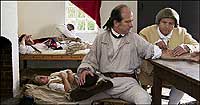
Chad Chadwick, as the doctor, inoculates Mike Luzzi while Dan Moore on the ground, Jay Howlett on the bed, and Sonny Tyler against the wall suffer the effects of immunization.
The information I received that the enemy intended Spreading the Small pox amongst us, I coud not Suppose them Capable of—I now must give Some Credit to it, as it has made its appearance on Severall of those who last came out of Boston.
A Boston physician said "that he had effectually given the distemper among those people" who were leaving the city. Rumors and suspicions of British efforts to spread disease in the American troops were persistent throughout the war.
Smallpox played a role in the failure of American forces to capture Quebec. It was rumored that General Guy Carleton, British commander in Quebec, sent infected people to the American camp. Thomas Jefferson was convinced the British were responsible for illness in the lines. He later wrote: "I have been informed by officers who were on the spot, and whom I believe myself, that this disorder was sent into our army designedly by the commanding officer in Quebec." After the defeat at Quebec the American troops gathered at Crown Point, where John Adams found their condition deplorable:
Our Army at Crown Point is an object of wretchedness to fill a humane mind with horrour; disgraced, defeated, discontented, diseased, naked, undisciplined, eaten up with vermin; no clothes, beds, blankets, no medicines; no victuals, but salt pork and flour.
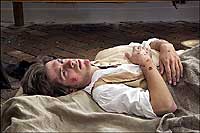
Inoculation produces a milder form of the disease, making the patient ill for several days. Interpreter Dan Moore is the sick soldier.
In most cases the evidence against the British is strong, if circumstantial, yet some evidence is quite explicit. When the British sent an expedition to Virginia in 1781, General Alexander Leslie revealed to Cornwallis his plan to spread disease among the Americans. He said that "above 700 Negroes are come down the River with the Small Pox," whom he proposed to distribute "about the Rebell Plantations." His motive was clear, but it is not known if he carried out his plan.
It is evident that the British had few qualms about the tactic of infecting the general population as well as the enemy army with smallpox. In 1777 a British officer, Robert Donkin, published in New York a little book entitled Military Collections and Remarks. In a footnote he offered a suggestion:
Dip arrows in matter of smallpox, and twang them at the American rebels, in order to inoculate them; This would sooner disband these stubborn, ignorant, enthusiastic savages, than any other compulsive measures. Such is their dread and fear of that disorder!
Elizabeth A. Fenn, professor of history at George Washington University, writes in her article "Biological Warfare in Eighteenth-Century North America: Beyond Jeffery Amherst" that because the Americans were referred to as "savages" Dunkin believed any means was justified to exterminate them. Such attitudes were probably often talked of, but they were not the kind of suggestions that should be put in writing. Someone must have believed that Donkin had gone too far. The footnote survives in three copies of the book. In all others, it has been removed.
What are considered acceptable military tactics at one time may not be acceptable to later generations. Eighteenth-century warfare was increasingly conducted by relatively compact armies with the result of less loss and harassment of civilians. "Laws of war" were becoming more concerned with the protection of noncombatants as well as unnecessary suffering of military personnel. By the end of the nineteenth century efforts were being made to prevent the horrors of chemical warfare.
The First Hague Peace Conference of 1899 issued a declaration prohibiting the use of poison and materials causing unnecessary suffering. The Geneva Protocol adopted in 1925 prohibited the use in war of "asphyxiating, poisonous, or other gases and of all analogous liquids, materials, and devices," as well as biological methods of warfare. The Geneva Protocol has been accepted by most countries though not always followed. A German military maxim applies; roughly translated, it says: "To get out of a desperate situation, you have to bend the rules."
Consulting editor Harold Gill contributed to the autumn 2003 journal an article on colonial divorce.

